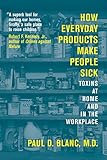In a book I reviewed earlier this week, How Everyday Products Make People Sick, by Dr. Paul D. Blanc, there is one part that both angered and sickened me. It had to do with a review of the effects of lead by the conservative think tank – the American Enterprise Institute – Brookings Joint Center AEI/BJC on Regulatory Studies. The comment shows the kind of denial and obfuscation that the conservative right uses to protect industry’s ability to dump toxins on us despite overwhelming research.
Lead is a well known neurotoxin that was used in both gasoline and paint prior to the 1970s. According to numerous studies, lead causes IQ levels to drop, especially in children. What amazed me is that the AEI/BJC did not dispute the fact that lead was neurotoxic but that economically parents gain only $1,100 per IQ point while their children gain $1,900 through lead abatement. Are they kidding me??? Do we measure life benefits in terms of parents versus children? What kind of moral system do these people hold dear? One of their comments was “This analysis suggests lead standards will redistribute resources from parents to their children, because the benefits to parents are less than the costs of the standards. The Environmental Protection Agency and the Department of Housing and Urban Development should reconsider their lead standards.”
Appalling? You bet. Morally corrupt? Closer to the truth. My parents came to this country back in 1953 to make their kids lives better, not at our expense but at theirs. The AEI/BJC is one of the many groups that our present administration looks to for advice. What does that say for us when the argument used to reconsider reintroducing lead into our environment is that parents should make more money at the expense of their children?
But lest this be a Bush-Bashing party, let me make it clear that this kind of disgusting government behavior has been going on for centuries and by just about every government in this world. In 1868, the British Fisheries Preservation Authority wrote a pamphlet entitled On Pollution of the Rivers of the Kingdom. they saw the problems back than.
Dr. Blanc even points out that in 1549 writers talk about things like sick building syndrome (not that term exactly) in a paper called Aerarium Sanitatis. We know that pollution and the dumping of toxins are killing us and causing incalcuable damage to our children and generations to come. As long as it is business as usual, we will continue to be dumped on and lied to about the dangers that surround us.
Please get this book. I don’t care if you get it through clicking on the link below or through any portal you chose, get it. It is one of the finest books on the effects of environmental toxins on human health I have ever read and believe me, I have read a lot of them.



